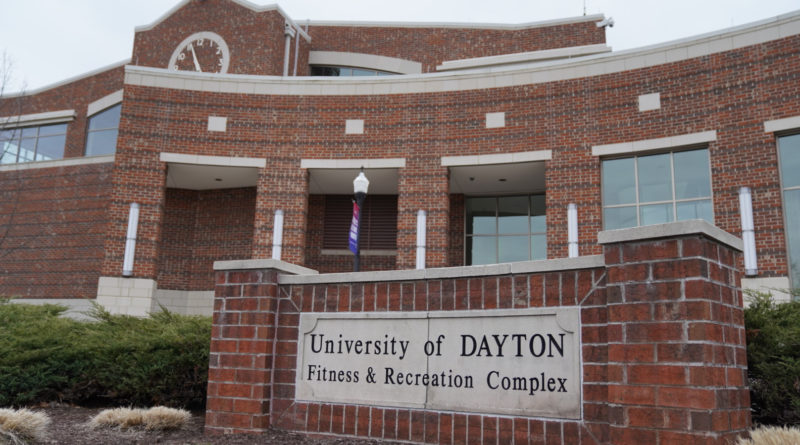Intramural sports persist at UD as COVID-19 pandemic continues
Even through the COVID-19 pandemic, UD’s RecPlex has remained busy as intramural sports continue. Photo courtesy of Flyer News.

Peter Burtnett
Sports Editor
Intramural sports are a staple of any college campus, and that tradition continues for the University of Dayton, even through the COVID-19 pandemic.
Led by Mark Hoying, serving as Interim Assistant Director for Intramural Sports, UD intramurals was able to put together a successful fall season, with 1,794 students participating in 18 different sports, and 98 percent of participants reported feeling “safe or very safe during Intramurals regarding COVID exposure.”
After the outbreak at Dayton shortly after move-ins (mid-August through early September), most of the intramural department was furloughed. Once things returned to some sense of normalcy, Hoying had taken on more responsibilities, and worked with health officials to re-open the RecPlex, breaking up the re-opening into phases, the first of which was to resume activities at the RecPlex.
“We quickly submitted in August a phase 2 proposal,” Hoying said. “That (proposal) was basically a packet of sports and adapted rules that we were hoping to propose to the health board that we think we can play these sports safely.”
With sports like baseball already involving plenty of social distancing, Hoying said UD intramurals also adapted dodgeball and involved steps to separate and quarantine cornhole bags in case a player tested positive for COVID-19. Hoying said they never had to deal with that dilemma.
Nick Rhodes, student programming assistant, said in a text to Flyer News that the key to having the same amount of success in the spring is to find the middle ground between getting back to normal while “still following social distancing guidelines.”
“Last summer we got thrown into the fire in late August and had to throw everything together quickly without much second guessing in order to provide Intramurals,” Rhodes said. “In addition to that, we really know what to expect with COVID at the time and how the University would handle it (e.g. University shutting down most things for close to a month).
“Coming into the spring we are more prepared and know what to expect and can be more proactive for sports and giving people more time to sign-up as well as having two full sports seasons with maximum amount of playing time. (The) schedule is going to be a lot smoother and systematic this semester. (I’m) looking forward to it.”
Hoying added that the leadership has gotten “good at keeping people safe” and thinks that allowing people to get away from being cooped up was a large part of the intramural success in the fall semester.
Rhodes’ role in intramural sports has also been “very much elevated,” like Hoying, and has been working with a smaller staff because of hiring being frozen because of COVID-19. In his expanded role and the program bringing in new sports, one of Rhodes’ biggest challenges was scheduling.
“Scheduling was also obviously tougher as well with a smaller staff than usual,” Rhodes said. “But shoutout to the amazing staff I work with because they stepped up and worked their butts off to be able to perform our jobs at the peak level that is expected of us. With their efforts, Intramurals did not falter any bit this past semester and with some new faces this coming semester, we should exceed expectations.”
With most years having a structured schedule from years past, Rhodes had to put together the schedule while creating rules documents, new IMLeagues pages, quizzes for participants and training for the staff because of the new sports.
The toughest challenge for Rhodes was “being able to offer the same level of competitive sports under safe conditions according to University guidelines.”
“Coming in, we knew it would be a challenge to offer sports like soccer, basketball, volleyball and flag football (our most popular sports),” Rhodes said. “But by semester’s end we offered all of them to some variant except soccer.”
Rhodes said the program actually had more intramural seasons in the fall than ever before.
“Brining socially distant sports like cornhole, chipping, and disc golf into season form really drove up participation,” Rhodes said. “Hand-in-hand with offering the same sports safely, making sure our staff was trained and diligent about the job we had to perform with COVID-following guidelines and being strict with all participants was hard early on, but through the tremendous staff we have in competitive sports, we were… very consistent across all aspects of our department.”
Rhodes expects much of the same as the fall semester, and was excited to announce that the university has rented an ice rink for a limited time on Stuart Field.
“So expect some ice intramurals as well!”
Some other sports that will be coming to UD intramurals this spring include broomball (a hockey adaptation that involves, you guessed it, brooms, a small plastic ball instead of a puck, and playing on ice wearing tennis shoes instead of ice skates) and human curling (a group of four people, three in an inner tube and one pushing the modified curling stone, with another team aiming to knock the opposing teams out of the point circles).
“First, (prospective athletes should) come out and check it out,” Hoying said. “IMLeagues.com is where everyone goes and signs up, it’s completely free, so they can create an account and they can log in and see the rules, and see the adaptations, and that would be a way for them to see what this is going to be like.
“We’ve gotten a lot of feedback that the barrier for first and second-year students especially is, ‘Hey, we don’t see, we’re not out seeing each other and it’s hard to connect and form teams,’ and we’re here to help with that.”
Hoying continued by saying that everyone has felt safe, and asked students interested in participating but hesitant about COVID-19 to trust the intramural leadership, which has had a 98 percent rate of feeling “safe or very safe.”
“We’re a part of health and wellbeing on campus,” Hoying said. “I am passionately confident that (students) coming out and playing intramurals, and being active… whether it’s physical health or mental health… it’s an instant fix. It sounds like a drug thing, but it is the joy, the competition, the connecting with others that they get through doing these things is vitally important, and that is why we’ve been pushing this stuff forward.”
Student’s Perspective
One of the students who participated in the fall season and expects to play a big role in the spring season is senior Benji Bussen, who played in 42 games on 20 different teams in fall 2020.
From Bussen’s perspective, the athletes haven’t faced “a ton of challenges,” but the COVID-specific rules have been “weird.”
“For example, in softball one of the new rules is that you’re not allowed to step on home plate,” Bussen said. “But thankfully Team Jerry never scores so we don’t really have to worry about that one. Another odd thing to adjust to is wearing masks while playing, but we’re built different so we’ll come in second place in every sport with or without masks.”
Moving into the spring season, Bussen and the rest of his constituents will have a chance to participate in new sports like Broomball, Human Curling, Intercollegiate Basketball Shooting League, Foosball Floor Hockey, Pickleball, and Indoor Flag Football Tournament. To continue the success from an overarching perspective is for leadership to “keep doing what they’ve been doing and things will go well.”
Over 90 percent of participants reported feeling safe while playing intramurals last semester and that’s because the Rec makes rules to do just that and does a good jbo enforcing them,” Bussen said. “So as long as they continue that we’ll be in a good place to continue that success. As for the steps Team Jerry needs to take to continue our success from last semester, I know everyone on the team has been training nonstop over break to ensure that we can participate in as many sports as possible this season.”
Bussen also joked that he expects the spring semester to include “lots of disappointment, with a marginal amount of success that we will undoubtedly celebrate for weeks on end.”
“We’re looking to go out the same way we started – mediocre,” Bussen said.
For more sports news like Flyer News on Facebook and follow us on Twitter (@FlyerNews & @FlyerNewsSports) and Instagram (@flyernews)

